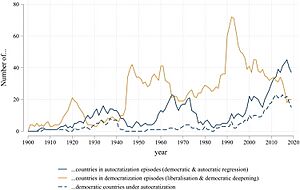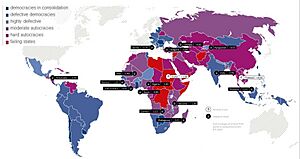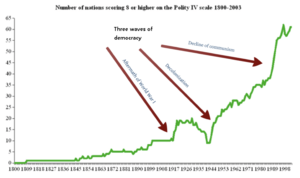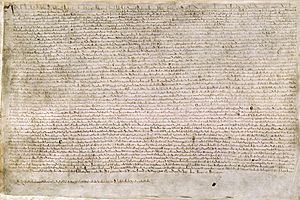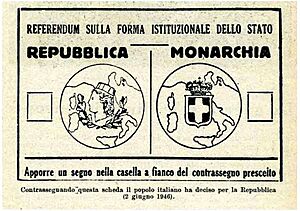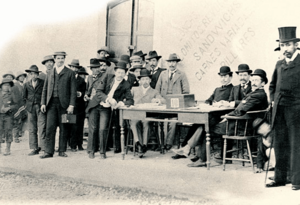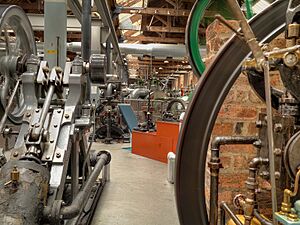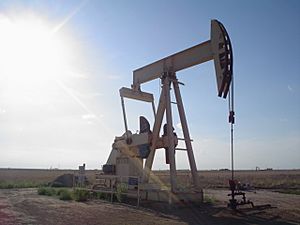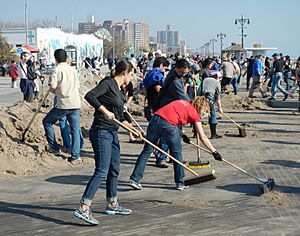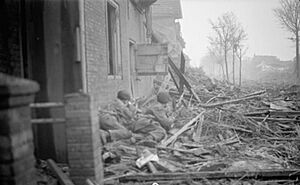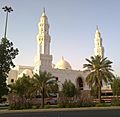Democratization facts for kids
Democratization is when a country's government changes from being controlled by a single person or small group (an authoritarian government) to becoming more democratic. This means more people get a say in how their country is run.
Many things can cause a country to become more democratic. These include how well its economy is doing, its history, how active its citizens are, and what's happening in the world. Sometimes, powerful leaders help make these changes. Other times, it's ordinary people pushing for change from the bottom up. Understanding democratization also helps us understand why countries go to war or how their economies grow.
The opposite of democratization is called democratic backsliding or autocratization. This is when a country becomes less democratic.
Contents
What is Democratization?
Democratization is about big changes in how a country is governed. It's the journey from a system where one person or a small group holds all the power to one where citizens have more say.
Signs that a country is becoming more democratic include:
- Changes to how elections are run.
- More people being allowed to vote.
- People becoming more interested in politics.
How We Measure Democracy
Experts use different ways to measure how democratic a country is. These are called democracy indexes. Some well-known ones are Freedom House, Polity data series, V-Dem Democracy indices, and the Democracy Index. These tools help us compare countries and see how they are changing over time.
Waves of Democracy
A "wave of democratization" is a period when many countries around the world become more democratic at the same time. A famous scholar named Samuel P. Huntington identified three big waves in history:
- The First Wave (1828–1926) brought democracy to places like Western Europe and North America in the 1800s.
- After this, many dictatorships rose during the time between World War I and World War II.
- The Second Wave (1943–1962) started after World War II. But it slowed down in the 1960s and 1970s.
- The Third Wave (1974–present) began in 1974 and is still happening. This wave saw many countries in Latin America and the former Eastern Bloc become democratic.
Sometimes, these waves of democracy are followed by waves where countries become less democratic.
The V-Dem Democracy Report for 2023 noted that 9 countries became more democratic, including East Timor and The Gambia. It also noted 9 countries that saw a "U-Turn" in democracy, such as Thailand and Tunisia.
How Countries Became Democratic
Throughout history, people who wanted democracy often succeeded peacefully. This usually happened when governments were weak, especially after big conflicts. Another way is when leaders who have all the power decide to allow elections, while still trying to keep some control. The path to democracy can be long and have many ups and downs.
France
The French Revolution in 1789 briefly gave many people the right to vote. But then came years of wars and different rulers, some of whom were very powerful and undemocratic. After the Franco-Prussian War (1870–71), France finally established a lasting republic where people had more say.
Germany
Germany's first democracy, the Weimar Republic, was created in 1919 after World War I. It only lasted 14 years before Adolf Hitler and the Nazis took over. Historians still discuss why this attempt at democracy failed. After Germany lost World War II, democracy was brought back in West Germany with help from the United States.
United Kingdom
In Great Britain, important steps towards democracy happened over centuries. The Magna Carta in the 13th century limited the king's power. In the 1600s, the English Civil War was fought between the King and Parliament. This led to more discussions about people's rights. The Glorious Revolution in 1688 further strengthened Parliament and limited the monarch's power, ensuring that the king could not rule alone. Over time, more and more men gained the right to vote, with a majority getting it by 1884.
Italy
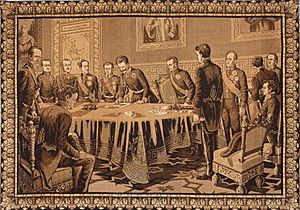
In 1848, riots and revolutions across Italy forced rulers to grant constitutions, which are rules for how a country is governed. One of these, the Albertine Statute, later became the constitution for the unified Kingdom of Italy in 1861. This kingdom was a constitutional monarchy, meaning it had a king but also a parliament.
However, in 1922, the Fascist dictatorship took over. After World War II, Italians were angry at the monarchy for supporting the Fascists. In 1946, Italy held a vote and decided to become a republic. A new democratic constitution was created and came into effect in 1948.
Japan
Japan introduced some democratic changes during the Meiji and Taishō periods (late 1800s to early 1900s). But society was still very traditional and controlled by powerful groups like the military. After World War II, during the Allied occupation, Japan adopted a much stronger and more open democracy.
Latin America
Many countries in Latin America became independent in the early 1800s. They quickly started having representative governments and elections. Some of these early democratic attempts happened even before many European countries had them. However, it wasn't until the 1930s and 1940s that most working-class people gained the right to vote.
United States of America
The American Revolution (1765–1783) created the United States. The new Constitution set up a strong federal government with a president, courts, and a Congress. At first, only white men who owned property could vote. Slavery was ended after the American Civil War (1861–1865). Full civil rights for African-Americans were achieved in the 1960s.
What Helps or Hinders Democracy?
Many things can either help or stop a country from becoming more democratic. These include economic situations, political choices, culture, and what's happening internationally.
Money and Modernization
Some experts believe that as countries become richer and more developed, they are more likely to become democratic. This idea is called modernization theory. Richer democracies also tend to stay democratic. Before the Industrial Revolution, democracy was very rare.
However, it's not always simple. Some argue that economic development doesn't directly cause democracy, but it makes it easier for democracies to last. For example, when a country's economy shifts from farming to manufacturing and services, new groups of people gain economic power. This can lead to them demanding more say in how the country is run.
Some studies suggest that economic development helps fragile or unstable governments become democratic. But it might also make it harder for strong authoritarian leaders to lose power.
More cities and towns (urbanization) can also help a country become democratic. Also, trade agreements between countries can encourage democracy, especially if the trading partners are already democratic.
Many thinkers believe that a large middle class is important for democracy to grow and last.
How Money Moves Around the World
The way money moves between countries can also affect democracy. Some believe that when money flows freely across borders, it can force governments to be more open and honest. This can strengthen democratic institutions.
International organizations like the International Money Fund (IMF) and World Bank often encourage democratic reforms. They might offer financial help or trade deals if countries follow democratic rules.
Rich vs. Poor and Democracy
The gap between rich and poor can affect democracy. In very equal societies, people might not feel a strong need to revolt, so there's less pressure for democracy. In very unequal societies, powerful elites might fight hard to stop democracy because it could mean losing their wealth and power.
Democracy is often more likely to emerge in countries where the gap between rich and poor is somewhere in the middle. Here, elites might agree to share power because they see the threat of revolution as real, but the cost of giving up some power isn't too high.
Natural Resources
Research shows that countries with a lot of oil wealth often have lower levels of democracy and stronger authoritarian rule. This is sometimes called the "resource curse." The idea is that governments with lots of oil money don't need to tax their citizens as much, so they don't need to listen to them.
However, some argue that this isn't always true. For example, in Ecuador, oil money actually helped the country become more democratic. The government had other ways to get money, so it could make policies that helped citizens without taking money from the rich. This reduced fears of wealth redistribution and allowed for a smoother transition to democracy.
Culture and Values
Some people used to think that certain cultures were better suited for democracy than others. For example, Western culture was often seen as ideal. However, today there are many strong democracies in non-Western countries, such as India, Japan, and South Korea.
Some scholars have debated whether religions like Confucianism or Islam are obstacles to democracy. But others argue that the lack of democracy in some Muslim countries might be more about oil wealth than religion itself.
A country's "democratic political culture" – meaning its shared beliefs and values that support democracy – can help it become and stay democratic. Also, studies suggest that leaders who were educated in Western countries might improve a country's chances of becoming democratic.
Education
Education is often seen as a key factor in creating stable democracies. It can make people more tolerant, more likely to participate in politics, and can help reduce inequality. Studies show that more education can lead to higher levels of democracy, especially in poorer countries.
However, new research suggests that while democracy often happens around the same time as more people get primary education, democracy itself might not be the main reason for this increase in schooling.
Community Involvement
Civil society refers to groups and organizations that are not part of the government, like charities or community clubs. Social capital means the networks, trust, and shared rules that help people work together.
Some experts, like Robert Putnam, argue that communities with strong networks of civic groups are better at building trust and working together. This can lead to more participatory democracies. However, others argue that civil society can sometimes make social divisions worse, as happened in Germany before the Nazis came to power.
Research shows that protests for democracy, especially nonviolent ones, are often linked to countries becoming more democratic. In many cases, these protests have been more successful than armed revolts or changes made by leaders alone.
How Leaders Make Choices
Some scholars believe that democratization isn't just about big, long-term causes. Instead, it can depend on the choices and actions of leaders and opposition groups.
Elite-Driven Changes
Sometimes, leaders who have all the power might choose to allow more democracy. They might do this to prevent a revolution or to keep some control. If the cost of stopping protests is too high, they might decide to share power. However, some argue that these "elite-driven" changes might not always lead to a truly fair democracy.
One study suggests that leaders often make mistakes when trying to prevent democracy. They might call elections and lose, or start small reforms that get out of hand. These mistakes can weaken their power and open the door for democracy.
Military dictatorships are often more likely to transition to democracy than other types of dictatorships. This is because military leaders often see themselves as temporary rulers, aiming to fix problems before handing power back to a civilian government.
The threat of civil conflict can also push leaders to make democratic changes. For example, riots caused by drought in Africa have sometimes led governments to make democratic concessions to avoid bigger conflicts.
When Dictators Leave Power
When a dictator dies or is removed from power, it doesn't always mean democracy will follow. In most cases, the authoritarian system continues, even if a new leader takes over.
Women's Right to Vote
Some argue that when we look at the history of democracy, we should pay more attention to when women gained the right to vote. If we include women's suffrage, the data shows a long, continuous period of democratization from 1893 to 1958, with only setbacks during wars.
Global Influences
War and Peace
While wars can sometimes help build strong states, they are generally a big obstacle to democracy. Peace, on the other hand, often helps democracy grow. When people feel safe, they tend to support more equal values and democracy. But when they feel in danger, they might prefer a strong leader and an authoritarian government.
International Organizations
International groups and alliances can also help countries become democratic. For example, joining the European Union has encouraged many countries in Eastern Europe to adopt democratic reforms. NATO expansion has also been linked to democratization.
Global ideas about democracy and pressure from international financial groups can also lead to countries becoming more democratic.
Foreign Influence
Sometimes, democracy has been brought about by military intervention, like in Japan and Germany after World War II. After countries gained independence from colonial rule, some became democracies, but many later became authoritarian.
Some scholars argue that foreign interventions can actually hurt democracy. However, the end of empires has also helped democracy emerge as former colonies gained independence.
Geography
Some experts believe that countries with access to the sea are more likely to become democratic. This is because being near the sea can make it easier for people, goods, money, and ideas to move around, which can help democracy grow.
How History Shapes Democracy
Past Events
Historians often look at past events to understand why some countries became democratic and others didn't. For example, the way countries were colonized can have a lasting impact on their path to democracy.
Order of Events
Scholars also discuss whether the order in which things happen affects democracy. Some argue that a country needs strong government institutions before it can have widespread participation from its citizens. Others believe that competitive politics should come first.
More recently, the debate has focused on whether building a strong state should happen before or after democratization. Some argue that countries that built strong states first have better quality governance. However, other research challenges this idea, suggesting that the starting point might be less important than whether the state and democracy can work together in a positive cycle.
Images for kids
 | Delilah Pierce |
 | Gordon Parks |
 | Augusta Savage |
 | Charles Ethan Porter |


